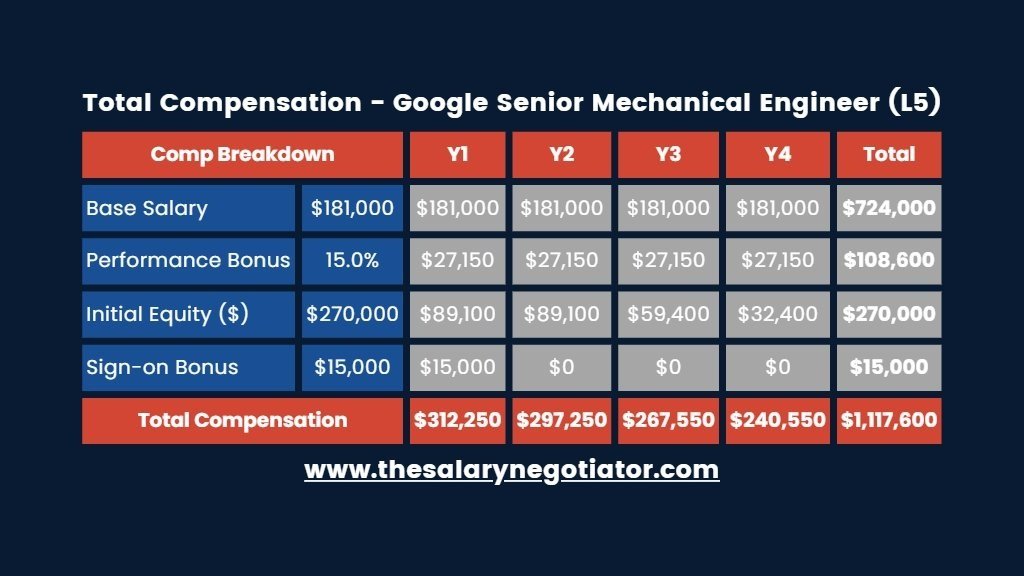Mechanical Engineer Salary Negotiation: How To Negotiate a Mechanical Engineer Job Offer
If you’ve made it through the interview process and have finally received a job offer in mechanical engineering, congratulations! That’s no easy feat. However, before you get ahead of yourself, there is still one more step you need to complete: negotiating your mechanical engineer salary.
Just like how you design and develop innovative solutions as a mechanical engineer, successfully negotiating a job offer all comes down to effective research and problem-solving. You already have the skills needed to negotiate well—all you need now is a step-by-step guide to navigate the process.
In this article, we are going to share with you our proven strategies for how to negotiate a mechanical engineer job offer successfully. Over the years, we have helped countless mechanical engineers just like you negotiate for better compensation using our tips and insights.
So while you might be hesitant to negotiate at first, there’s really nothing to be afraid of. In reality, negotiating a mechanical engineering job offer gives you an opportunity to further highlight your problem-solving skills to the recruiting team while also giving you the chance to increase your career earnings. It’s a win-win.
Want to Negotiate Your Offer? Get offer-specific guidance from a Salary Negotiation Coach. We help mechanical engineers negotiate competitive job offers.
Or leverage our Salary Negotiation Courses and Salary Negotiation Templates.
 Job Offer Negotiation Course
Job Offer Negotiation Course
- Get our job offer negotiation strategies, templates, scripts, and guidance.
- Access our step-by-step lessons, compensation research guides, and tools.
- Access Now
 Raise Negotiation Course
Raise Negotiation Course
- Get our raise negotiation strategies, templates, scripts, and guidance.
- Access our step-by-step lessons, compensation research guides, and tools.
- Access Now
Understanding the Compensation Components of a Mechanical Engineer Salary
There is a broad demand for mechanical engineers. So whether you’ve been offered a position as an aerospace mechanical engineer or an automotive mechanical engineer, your compensation package should reflect the current demand for someone with your skillset.
No matter how competitive your initial offer may seem, it’s still critical that you do your due diligence to understand each individual aspect of your total compensation package.
We don’t blame you if after receiving your offer you really only focused on the base salary for your new role—that’s what most people do. However, your mechanical engineer salary is typically only one portion of your overall compensation package. Most mechanical engineering job offers will also include things like an annual performance bonus, initial equity package, sign-on bonus, and other benefits like extended paid time off and maybe even remote work flexibility depending on your type of role.
Only focusing on the base salary of your job offer would be a mistake; you’ll have the best chance of increasing your entire compensation package if you understand each of these components before negotiations begin.
For example, here is what a Google senior mechanical engineer salary may look like in their initial offer:
Google mechanical engineer salary
Now let’s spend some time taking a closer look at the different mechanical engineering compensation components.
MECHANICAL ENGINEER BASE SALARY
The first component of your compensation package is probably the one you’re most familiar with: your mechanical engineer base salary. Your base salary is essentially the fixed guaranteed pay you receive in exchange for the work you do.
Your base salary is not tied to your performance but instead is determined by a preset salary range for your specific role at your specific company. The different levels of mechanical engineering at your company will each have different pay ranges with set minimum and maximum amounts associated with them that dictate what your base pay can be.
For example, the pay range for an entry level mechanical engineer salary would be different from the range for a senior mechanical engineer salary or principal mechanical engineer salary at the same company, and same role different across companies (i.e., a Google mechanical engineer salary will differ from an Apple mechanical engineer salary).
Here’s why these mechanical engineer base salary pay bands are so important: even though mechanical engineering roles are competitive, their initial offers rarely come in at the top of their pay bands. So if you know what the pay range for your specific role is, you can negotiate it up to the top end of that band.
MECHANICAL ENGINEER PERFORMANCE BONUS
Many engineering job offers will also include an annual performance bonus. An annual mechanical engineer performance bonus is most often a percentage of your base salary that’s dependent on both your performance and the performance of the company you work for. What this means is that your performance bonus could fluctuate based on the targets both you and your company hit. While it’s possible in some cases to exceed the target percentages if you and the company outperform your goals, it’s best to assume the average bonus payout when evaluating this component of your total compensation package.
While a performance bonus can make a huge difference in your total yearly compensation, we have found that mechanical engineer performance bonuses are typically non-negotiable for most companies—meaning the bonus percentage for your specific role and level cannot be changed. However, since your bonus is usually a percentage of your base salary, the higher you negotiate your base salary, the higher your bonus could be.
MECHANICAL ENGINEER EQUITY
The next element of your compensation package to evaluate is if your mechanical engineer job offer incudes an equity package. Equity is a highly sought-after compensation component in many types of roles. As a mechanical engineer, you may receive an initial equity grant in your job offer depending on the company and role level. This equity can be offered either as RSUs (restricted stock units or restricted stock awards) or stock options. This grant will include a bundle of shares or options that vest over a defined timeframe (i.e., four years), called a vesting schedule. While it’s true that these equity packages are most commonly offered by tech companies, we’re beginning to see many non-tech public companies offer them as well.
Mechanical engineer equity can be an extremely valuable form of compensation. The catch is that equity does fluctuate based on the market value of the company you work for. For example, say you secure a job offer with Microsoft—you’ll benefit if Microsoft’s share value goes up, but you’ll take a loss if their share value goes down. Another important thing to remember is that if you leave the company before the equity vests, you risk forgoing it all together.
In our years of experience, we’ve found that equity is usually a negotiable aspect of a compensation package for mechanical engineers. However, as much as we recommend you to always push for more equity, we also encourage you to focus on all the other compensation components as well. Doing so will give you the best chance of reaching the top end of your total compensation pay band.
MECHANICAL ENGINEER SIGN-ON BONUS
Most mechanical engineer job offers will include a sign-on bonus—it just might take some negotiating first. A mechanical engineer sign-on bonus is a one-time bonus that acts as an incentive to join the company and to cover any lost bonuses or unvested equity at your current company.
Knowing how to negotiate for a mechanical engineer signing bonus is essential since not all companies provide these bonuses in their initial offers. Fortunately, we’ve had countless successes securing large mechanical engineer sign-on bonuses. We’ve seen firsthand how incredibly valuable these bonuses can be which is why they should never be overlooked during negotiations. Even if you’re not walking away from money at your current company, we still recommend that you negotiate for this element of your total compensation package.
Most mechanical engineering signing bonuses are paid in one lump sum within the first 30 days of your employment. However, if you leave the company within your first year (or other designated timeframe), you may have to pay the bonus back. However, other companies approach sign-on bonuses differently. For example, Amazon’s sign on bonus is separated into a year one and year two bonus—which can be paid out monthly instead of in one lump sum payment. Make sure you do your research to understand exactly how sign-on bonuses work at the company you’re considering.
MECHANICAL ENGINEER EQUITY REFRESHER
The next element of your compensation package to consider is if there is a mechanical engineer equity refresher. While it’s possible to receive an equity refresher (more stock) in your initial offer, you’ll find that most recruiters try to withhold the stock refresher details. This practice is common for equity refreshers at Meta and other industries that offer this annual perk.
During your negotiation, we recommend that you ask the hiring team to provide more details about the amount and timeline of the stock refresher. However, be prepared for the fact that many hiring teams shy away from sharing these specific details. This makes it difficult to compare this benefit across different mechanical engineering job offers which is why we don’t include this component in our total compensation calculation.
BENEFITS AND PERKS FOR MECHANICAL ENGINEERS
Benefits for mechanical engineers can vary significantly across different companies. These benefits often include standard things like medical insurance, parental leave, relocation assistance, retirement programs, or even tuition reimbursement.
A top perk of many mechanical engineering roles is the ability to work a flex schedule—where you work four longer days and get a 3-day weekend—which we recommend you bring up during the interview process. Unfortunately, most other benefits and perks for mechanical engineers are usually non-negotiable. However, you can sometimes get changes approved via an under-the-table agreement with your future hiring manager (i.e., your manager gives you extended parental leave).
Five Proven Steps to Negotiate a Mechanical Engineer Job Offer
At this point, you should be familiar with the different compensation components of your mechanical engineer job offer. Now it’s time for the exciting part: explaining how you can negotiate for a better total compensation package.
It’s important to note that the following negotiation steps are only for those who have actually received a job offer. Why? In our years of experience helping hundreds of career professionals successfully negotiate their job offers, we’ve found that it’s best to avoid starting the negotiation process until you have an offer in hand. You’ll have more leverage to negotiate once you’ve officially received an offer and you’ll be less likely to make mistakes like disclosing your salary expectations to the recruiter too early.
If you have received an offer and are ready to begin negotiating, we’ve outlined our proven strategies and insights below. While these are the key steps to a mechanical engineer salary negotiation, we strongly recommend mechanical engineers work with a Salary Negotiation Coach to guarantee success and get all of our strategies.
1) UNDERSTAND THE COMPONENTS OF YOUR MECHANICAL ENGINEER JOB OFFER
Since we’ve already gone over the most common compensation components of a mechanical engineer job offer this first step should be easy. As a quick reminder, make sure to review your job offer for a base salary, performance bonus, initial equity grant, sign-on bonus, and any benefits and perks. Understanding the various elements of your total compensation is an essential step before negotiating any job offer.
Use our Total Compensation Calculator to calculate your compensation components in this step if needed.

- Understand Total Compensation – Use our tool to break down and calculate the compensation in your job offer.
- Research & Compare Offers – Organize your compensation research and determine the right counter amount.
- Get Here
2) COMPLETE DUE DILIGENCE ON YOUR MECHANICAL ENGINEER PAY BY ASKING STRATEGIC QUESTIONS
Asking strategic questions is key to establishing an effective mechanical engineer counteroffer and it also shows the recruiting team that you are actively invested in knowing more about the role. Start by asking for clarification on items that the recruiter may have been vague about (i.e., What is the expected target bonus payout each year for this role?). These sorts of questions help you to collect valuable data points to use in the mechanical engineer pay negotiation.
Even if you’re confident you already understand all the different elements of the offer package, we still suggest you ask for even more information to further strengthen your counteroffer. If you’re having trouble coming up with things to ask, you can use our list of Strategic Questions to Build Negotiation Leverage. Our recommendation is to start asking questions relatively soon after you receive your initial offer.

- Build Negotiation Leverage – Ask the right questions to strengthen your negotiation before sending a counter.
- Email & Phone Scripts – Get our list of questions to ask and what to say if the recruiter wants to chat through them.
- Get Here
3) RESEARCH TO IDENTIFY WHAT MECHANICAL ENGINEER COMPENSATION SHOULD LOOK LIKE
Since the compensation for mechanical engineers will differ across companies, it’s important to spend time researching what your compensation should look like. You should spend some time investigating mechanical engineering pay ranges, the strength of your job offer, and how much you should ask for. Make sure that your research is specific to your role type and level (i.e., is it a manufacturing mechanical engineer role or a design mechanical engineer role) and where it’s located—whether that be hybrid, remote, or in-person.
Feel free to use online resources such as PayScale or Salary.com to help you with your research. However, make sure to compare your findings across multiple resources since compensation ranges on these types of sites are publicly reported by current or past employees, meaning the data they indicate may differ from what is now offered to new employees (i.e., the current employees’ total compensation is higher because of internal raises and promotions vs. what a new hire might receive). It’s also possible that the pay ranges on these sites could be inaccurate if the employee didn’t correctly upload all components of their mechanical engineering compensation package.
Whenever doing salary research, always keep in mind that if you accept the job offer, you’ll be expected to manage the same tasks as anyone hired for that same position. So regardless of your experience or background, you should push for at least the mid- to top-end of the total compensation range for your mechanical engineering role level.
You can use our Total Compensation Research Comparison Tool to help you with your compensation research and identify the pay ranges.

- Understand Total Compensation – Use our tool to break down and calculate the compensation in your job offer.
- Research & Compare Offers – Organize your compensation research and determine the right counter amount.
- Get Here
4) SEND A MECHANICAL ENGINEER COUNTEROFFER TO THE RECRUITER
After properly preparing for your negotiation (the first three steps), you should be ready to officially send over a mechanical engineer counteroffer.
Make sure when you send your counteroffer to the recruiter that you reference your pay range research findings and how the benefits differ from other companies and/or your current role. Countering a salary offer via email is almost always better than countering over the phone. Writing an email gives you the opportunity to draft exactly what you want to say (helping minimize the risk of going off-topic) while also ensuring that you have everything in writing. Presenting your mechanical engineering counteroffer in writing also makes it easy for the recruiter to forward it on and use internally to get you a better offer.
Just remember to always approach this step professionally and respectfully. To ensure proper communication, use our Counteroffer Drafts for examples to help you formulate a strategic counteroffer.

- Proven Counteroffer Templates – Built from hundreds of successful job offer negotiations.
- Negotiate with Confidence – Remove the guesswork with our professionally crafted counteroffers.
- Get Here
5) HANDLE ANY OBJECTIONS AND KNOW YOU ACHIEVED THE BEST MECHANICAL ENGINEER SALARY
While unlikely, sometimes it only takes one counteroffer and the hiring team will respond immediately with an updated offer package. However, you should initially be prepared to receive reasons from the hiring team for why they can’t make any increases to the mechanical engineer salary.
If this happens, respond graciously by stating you understand their limitations, but you still would appreciate it if they could take your thoughts back to their team for one last look at the offer like we suggest in our Objection Handling Scripts. We recommend doing this even if they insist their team will just say no—since once they agree to take it back to their team, they should return with a better offer.

- Overcome Recruiter Pushback – Proven scripts to handle pushback and keep your salary negotiation on track.
- Communicate Effectively – Use expert responses to get recruiters to advocate for you with the compensation team.
- Get Here
Once you receive an updated mechanical engineer job offer that meets your needs and falls appropriately within the pay bands you researched, you should be ready to send over an offer acceptance email. Congratulations on your successful mechanical engineering offer negotiation!

- Accept or Decline – Expert crafted job offer acceptance email and rejection email templates to share your decision.
- Professional & Genuine Tone – These help you communicate in a professional manner regardless of what you decide.
- Get Here
Mistakes to Avoid During Your Mechanical Engineer Salary Negotiation
When it comes to navigating negotiations, never forget that hiring teams are trained to get the best deal for their companies—meaning they will try to get you to accept without negotiating. To avoid this, check out some key mistakes that you should be aware of in any negotiation below.
AVOID SHARING SALARY EXPECTATIONS BEFORE YOU GET A JOB OFFER IN MECHANICAL ENGINEERING
Sharing your salary expectations typically works against you when trying to receive a fair job offer in mechanical engineering. Why? If you share a lower expectation than what the company could offer, they are more likely to offer you that lower compensation. But if you share a number higher than what they could offer, there is a chance that they could become disinterested and choose to go with a different candidate.
Always remember that the recruiters are working for the company, not you. Don’t feel pressured to discuss salary expectations before you learn more about the specific role, its benefits and compensation, and whether those elements feel like a good fit for you. After all, you’re also interviewing them to see if this role is something you want to pursue so be sure to overcome these tactics by responding like this.

- Salary Expectation Responses – Scripts to overcome recruiter salary expectation discussions and pre offer calls.
- Avoid Lowballing Yourself – These call scripts and email templates will help you get a competitive offer.
- Get Here
DON'T BE AFRAID TO NEGOTIATE A MECHANICAL ENGINEER JOB OFFER
Many people are afraid to negotiate because they fear offending the recruiting team or losing out on the job offer. However, we’ve helped facilitate hundreds of successful salary negotiations and we’ve never seen a company take back a mechanical engineer job offer because of an attempted negotiation. It's generally expected to negotiate, regardless of the role level and type—whether it’s an individual contributor, mechanical engineering manager salary, mechanical engineering director salary, or a VP mechanical engineering salary—you should negotiate your salary.
Don’t let salary negotiation myths keep you from attempting to negotiate a mechanical engineering job offer.
BE REALISTIC BY DOING YOUR MECHANICAL ENGINEER COMPENSATION RESEARCH
Even though mechanical engineering jobs have competitive pay, it’s still important to be realistic about what compensation is possible for the specific role you are offered. Make sure to use your problem-solving skills to only push for compensation that the company can realistically provide. For example, the mechanical engineering compensation package would be different at a start-up or non-tech company compared to the compensation package offered during an Nvidia salary negotiation or IBM salary negotiation.
Mechanical Engineer Salary Negotiation Coaching & Tools
Increasing mechanical engineer compensation requires a deep understanding of the company’s compensation philosophy and the right salary negotiation strategy. Our expert Salary Negotiation Coaching will help you navigate the mechanical engineer salary negotiation process and secure the top end of the pay band.
Or leverage our Salary Negotiation Courses and Salary Negotiation Scripts.
 Job Offer Negotiation Course
Job Offer Negotiation Course
- Get our job offer negotiation strategies, templates, scripts, and guidance.
- Access our step-by-step lessons, compensation research guides, and tools.
- Access Now
 Raise Negotiation Course
Raise Negotiation Course
- Get our raise negotiation strategies, templates, scripts, and guidance.
- Access our step-by-step lessons, compensation research guides, and tools.
- Access Now



